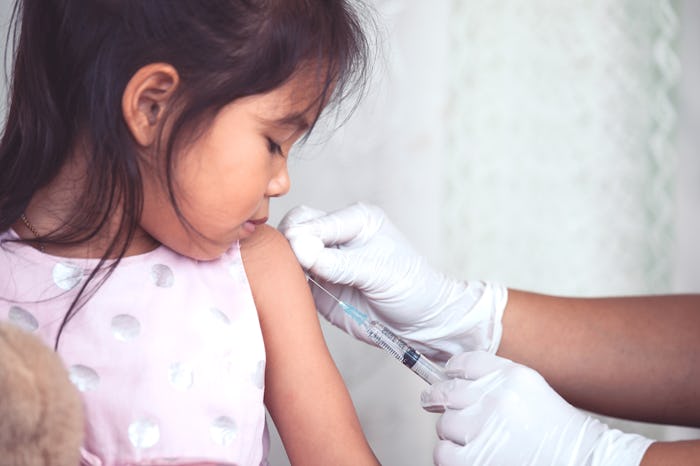Life
Measles Cases Increased Dramatically In Europe, & Experts Think Anti-Vaxxers Could Be To Blame
Since a vaccine for measles has been around for a long time now, you'd think the viral infection would be completely eradicated. Think again. Measles cases increased dramatically in Europe in 2017, according to the World Health Organization, and some experts say anti-vaxxers could be to blame. Or, at least, that their actions can take part of the blame for the situation.
WHO Europe said there was a "four-fold increase" of measles in Europe during 2017, The Guardian reported. There were more than 21,000 cases of the disease reported, as well as 35 deaths as a result of it, in what Dr. Zsuzsanna Jakab, WHO regional director for Europe, said was "a tragedy we simply cannot accept." The numbers are particularly disappointing because the number of cases of measles in Europe actually hit a record low in 2016, when there were only 5,273 cases there.
So what's with the increase? Experts say people opting out of vaccinations might be part of the problem, according to the BBC. The MMR vaccine can prevent measles, and the combined vaccine has advantages over the individual measles, mumps, and rubella vaccines, WHO reported. But vaccination rates for the highly infectious illness are falling behind in many parts of Europe, according to The Sun, and that's a real problem when it comes to the spread of the disease.
Measles is no joke. One in every 1,000 children affected by it develops encephalitis — a swelling of the brain that can lead to deafness or learning difficulties, according to The Guardian.
Even though his claims have been thoroughly discredited, researcher Andrew Wakefield's findings that claimed to link the MMR vaccine to the development of autism persist and damage public confidence in the vaccine, The Guardian reported.
In the WHO's report on the increase of measles cases in Europe, the agency cited "challenges" to lowering the numbers in certain countries, including "declines in overall routine immunization coverage, consistently low coverage among some marginalized groups, interruptions in vaccine supply, or underperforming disease surveillance systems." Basically, a big part of the reason the disease seems to be spreading comes down to people not being covered by immunization for one reason or another, and claims like Wakefield's certainly don't help matters.
The WHO found that Romania had the most cases of measles last year, with 5,562, according to NBC News. Italy had more than 5,000 cases, and Ukraine reported 4,767 cases. But Greece, Germany, Serbia, Tajikistan, France, the Russian Federation, Belgium, the United Kingdom, Bulgaria, Spain, Czechia, and Switzerland also reported high numbers, according to The Guardian.
The number of measles cases in Europe in 2017 was far higher than in the U.S., where, by comparison, the Centers for Disease Control and Prevention reported 118 cases of measles throughout 2017, according to Fortune. But some fear that a resurgence may be coming in the U.S. as well.
WHO officials seem more determined than ever to work on the prevalence of measles and on measles vaccination rates, specifically in Europe where the numbers surged so much, so quickly. In the organization's press release about the increase, Jakab said:
This short-term setback cannot deter us from our commitment to be the generation that frees our children from these diseases once and for all.
And protecting more kids from preventable, possibly deadly diseases is something everyone should want to work on, not just health officials. Just because a surge in measles cases isn't happening in the U.S. to the same degree it is in Europe doesn't mean parents in the U.S. shouldn't be concerned and vigilant.
To learn more about immunization schedules for both children and adults in the U.S., visit the CDC's website, or talk to your doctor.
Check out Romper's new video series, Bearing The Motherload, where disagreeing parents from different sides of an issue sit down with a mediator and talk about how to support (and not judge) each other’s parenting perspectives. New episodes air Mondays on Facebook.
